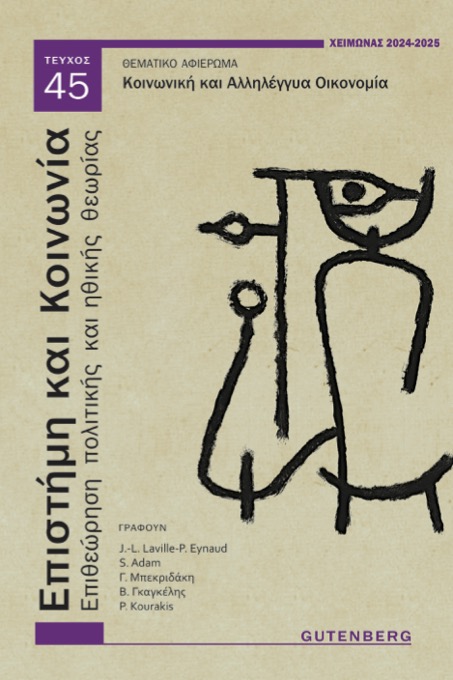Social reproduction within, outside and beyond capitalism: the role of prefigurative politics
Περίληψη
Social Reproduction Theory (SRT) has evolved into a rich and multifaceted theoretical corpus which enables both a deeper understanding of the current poly- and permacrisis of our times and the exploration of political strategies towards a post-capitalist future. This paper critically engages with SRT in order to offer further support on the analytical and political usefulness of the concept of social reproduction. More importantly, this paper addresses a missing link between SRT and prefigurative politics in the form of the Commons and Social Solidarity Economy. This missing link is crucial if we are to understand new struggles in the field of social reproduction and their positioning vis à vis overall capitalist societal reproduction. The main argument is that the Commons and Social Solidarity Economy approaches and practices have a role to play in social reproductive struggles in three interrelated ways: a) they articulate new and/or unmet social needs, b) they enact collective modes of provisioning, and c) they politicize alternative modes of collective provisioning.
Λεπτομέρειες άρθρου
- Πώς να δημιουργήσετε Αναφορές
-
Αδάμ Σ. (2025). Social reproduction within, outside and beyond capitalism: the role of prefigurative politics. Επιστήμη και Κοινωνία: Επιθεώρηση Πολιτικής και Ηθικής Θεωρίας, (45), 51–76. ανακτήθηκε από https://ejournals.epublishing.ekt.gr/index.php/sas/article/view/38269
- Ενότητα
- Άρθρα

Αυτή η εργασία είναι αδειοδοτημένη υπό το CC Αναφορά Δημιουργού – Μη Εμπορική Χρήση – Παρόμοια Διανομή 4.0.
Οι Συγγραφείς που δημοσιεύουν εργασίες τους σε αυτό το περιοδικό συμφωνούν στους παρακάτω όρους:- Οι Συγγραφείς διατηρούν τα Πνευματικά Δικαιώματα και χορηγούν στο περιοδικό το δικαίωμα της πρώτης δημοσίευσης ενώ ταυτόχρονα τα πνευματικά δικαιώματα της εργασίας προστατεύονται σύμφωνα με την άδεια Creative Commons Αναφορά Δημιουργού - Μη Εμπορική Χρήση - Παρόμοια Διανομή 4.0 Διεθνές , που επιτρέπει σε τρίτους - αποδέκτες της άδειας να χρησιμοποιούν την εργασία όχι για εμπορικούς σκοπούς, με την προϋπόθεση της διατήρησης των διατυπώσεων που προβλέπονται στην άδεια σχετικά με την αναφορά στον αρχικό δημιουργό και την αρχική δημοσίευση σε αυτό το περιοδικό και με διανομή τυχόν τροποποιήσεων υπό την ίδια άδεια όπως και το πρωτότυπο.
- Οι Συγγραφείς μπορούν να συνάπτουν ξεχωριστές, και πρόσθετες συμβάσεις και συμφωνίες για την μη αποκλειστική διανομή της εργασίας όπως δημοσιεύτηκε στο περιοδικό αυτό (π.χ. κατάθεση σε ένα ακαδημαϊκό καταθετήριο ή δημοσίευση σε ένα βιβλίο), με την προϋπόθεση της αναγνώρισης και την αναφοράς της πρώτης δημοσίευσης σε αυτό το περιοδικό.
- Το περιοδικό επιτρέπει και ενθαρρύνει τους Συγγραφείς να καταθέτουν τις εργασίες τους μέσω διαδικτύου (π.χ. σε ένα ακαδημαϊκό καταθετήριο ή στους προσωπικές τους ιστοσελίδες) πριν και μετά από τις διαδικασίες της δημοσίευσης, καθώς αυτό μπορεί να οδηγήσει σε παραγωγική ανταλλαγή ιδεών και σκέψεων καθώς επίσης και σε γρηγορότερη και μεγαλύτερη χρήση και ευρετηρίαση της δημοσιευμένης εργασίας (See The Effect of Open Access).



